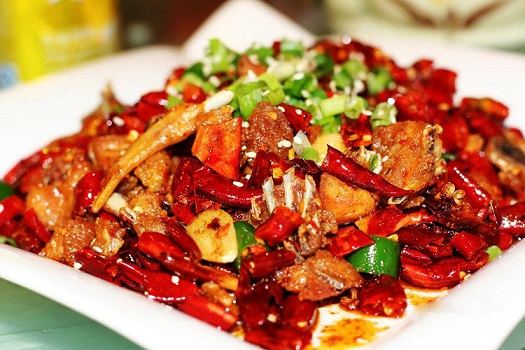Are you completely in love with food so hot to make your face sweat? Do you often visit your local restaurant to try some seriously spicy food? You are not alone. So many people love spicy food, but there are others who love it but worry that spicy food may be harmful for digestive health.Will there be any damage caused by the burning and hot sensation? Let's find out more about it.
Is Spicy Food Bad for You?
While it often feels as if your head would explode the moment you eat spicy food, there are no long-term side effects. In fact, it is the other way round – eating spicy food may actually offer several health benefits. These benefits come from the presence of a compound called capsaicin, which gives pepper that spicy effect. Here're more about it.

1. Prevent Ulcers
Is spicy food bad for you? No, it is not. And quite opposite to what most people believe, it does not cause ulcers. The kick you get after eating pepper is from capsaicin, which is actually quite beneficial. Not only does it reduce inflammation, it also inhibits the growth of H. pylori bacteria and prevents ulcer. Capsaicin produces some irritation the moment you taste it, but this is followed by a numbing effect. This is one of the reasons why it is used in many creams to relieve joint and other pain. A variant of capsaicin called resiniferatoxin is equally effective in relieving pain, which is used as an injected pain reliever.
2. Relieve Sinus Congestion
Eating hot, spicy food may prove effective in easing sinus congestion. It relieves clogged nasal passages and makes breathing easier. You may find it effective against fever, which is mainly because it raises your body temperature. Many people have experienced some relief from respiratory problems such as asthma and chronic bronchitis by eating spicy food.
3. Help Lose Weight
If you have been trying to lose weight, you may benefit from adding spicy food to your diet. You need to use more of hot peppers because they boost metabolism and also help curb appetite. Some studies have also found that capsaicin may help improve your body's ability to burn calories.
When Spicy Food Is Bad?
Is spicy food bad for you? No, it is not, but there are a few things to bear in mind when eating spicy food.
- Avoid spicy food if you already have ulcers. You will experience certain complications if you keep eating spicy food with ulcers.
- Avoid spicy food if you have urinary tract infections.
- Also keep in mind that hot, spicy food can cause watery eyes and nose, you may end up dealing with sinus irritation.
- You may want to avoid it when you have hemorrhoids. The reason is that your digestive system cannot break down capsaicin, and it is possible to get scorched when it goes out of your body. This can make things extremely painful for someone already dealing with hemorrhoids.
Water Doesn't Help, Try Milk Instead!
Some people are more sensitive to the spiciness of peppers and they may feel the burn in their stomach and mouth. If that is the case, you should not drink water because it is not going to help. The spicy component of the pepper is in the oils they contain, and these oils do not dissolve well in water. You may find some relief by drinking milk though.
Conclusion: What it implies is that eating spicy food is not bad if you do not have any existing health condition. Also, you need to know how much pepper you can handle in your food and then use it accordingly.
Careful with Preparation: Spice May Hurt Your Skin and Eye
Is spicy food bad for you? You already know the answer, but there is something else you need to know – handle spices with care because they can hurt your eye and skin.
Skin Effects
Handling certain spicy peppers carelessly may lead to a contact dermatitis reaction called Human Hand syndrome, which is characterized by swelling, pain, and redness. The Scoville heat unit is the measuring stick used to compare the spiciness of different peppers. You should handle peppers carefully, especially the one with a high Scoville heat unit. You should consider wearing gloves when handling peppers, and do not forget to wash your hands thoroughly with water and soap after handling. Dishwashing liquid with grease cutters, milk, or vegetable oil may also help get rid of the effects of peppers from your hands.
Eye Effects
You may develop swelling and severe pain if you touch your eyes after handling some specific hot peppers. Some people may develop a reaction after being exposed to the steam of cooking chili peppers. Place a wet towel over your eyes after you touch your eye and see your doctor immediately if you experience any problems, including blurred vision or serious eye irritation.
